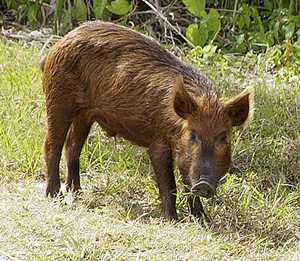Trichinellosis Information for Hunters


Black bears and feral hogs can harbor Trichinella infection, and have been associated with confirmed cases and outbreaks of trichinellosis among hunters in the United States.
Trichinellosis, also called trichinosis, is a disease that people can get by eating raw or undercooked meat from animals infected with the microscopic parasite, Trichinella. Persons with trichinellosis may initially experience gastrointestinal symptoms such as diarrhea, abdominal cramps, nausea and vomiting. These may be followed by fever, muscle pains, facial swelling, and fatigue. Symptoms can last from weeks to months, and can vary in severity from mild to severe. Some persons with Trichinella infection may experience no symptoms at all. Safe and effective prescription drugs are available to treat both Trichinella infection and the symptoms that occur as a result of infection.
Why do hunters need to know about trichinellosis?
People most often associate trichinellosis with the consumption of raw or undercooked pork. However, in recent years, more cases have been associated with eating raw or undercooked wild game meats (such as bear) than eating domestic pork products. Trichinella parasites can infect a wide range of animals worldwide. In the lower 48 states, trichinellosis cases and outbreaks have been caused by the consumption of brown and black bear, wild boar, and cougar; in Alaska, walrus and black, brown, grizzly, and polar bear; and in Hawaii, wild boar. Trichinella has also been detected in many other wild animals that are hunted, including coyotes, foxes, and raccoons. Coyotes and foxes have not yet been implicated in any reported trichinellosis cases or outbreaks, but there has been at least one reported case attributed to the consumption of undercooked raccoon meat.
Animals infected with Trichinella usually don’t appear to be sick, but may show some changes in behavior, such as being less active than what is normally expected. The parasite is microscopic, so it cannot be seen in infected meat with the naked eye. Although Trichinella infection can be prevented in pigs that are raised for pork, there are no feasible methods for reducing Trichinella infection in wild animals.
How can I prevent trichinellosis?
Properly handling and cooking meat will prevent trichinellosis. Whole cuts and ground meat from wild game animals should be cooked to an internal temperature of 160°F. A meat thermometer should be used because color is not a good indicator of doneness for game meat. Some methods of cooking, especially microwave cooking (which is not recommended), do not cook meat evenly. Smoking, freezing, or curing game meat does not kill all Trichinella species. Low –temperature smoking will not kill Trichinella, either.
Related Links
- Meat Preparation (USDA)
- Jerky and Food Safety
- Game from Farm to Table (Coming Soon)
- Disease Precautions for Hunters (AVMA)
- Page last reviewed: July 28, 2017
- Page last updated: July 28, 2017
- Content source:


 ShareCompartir
ShareCompartir